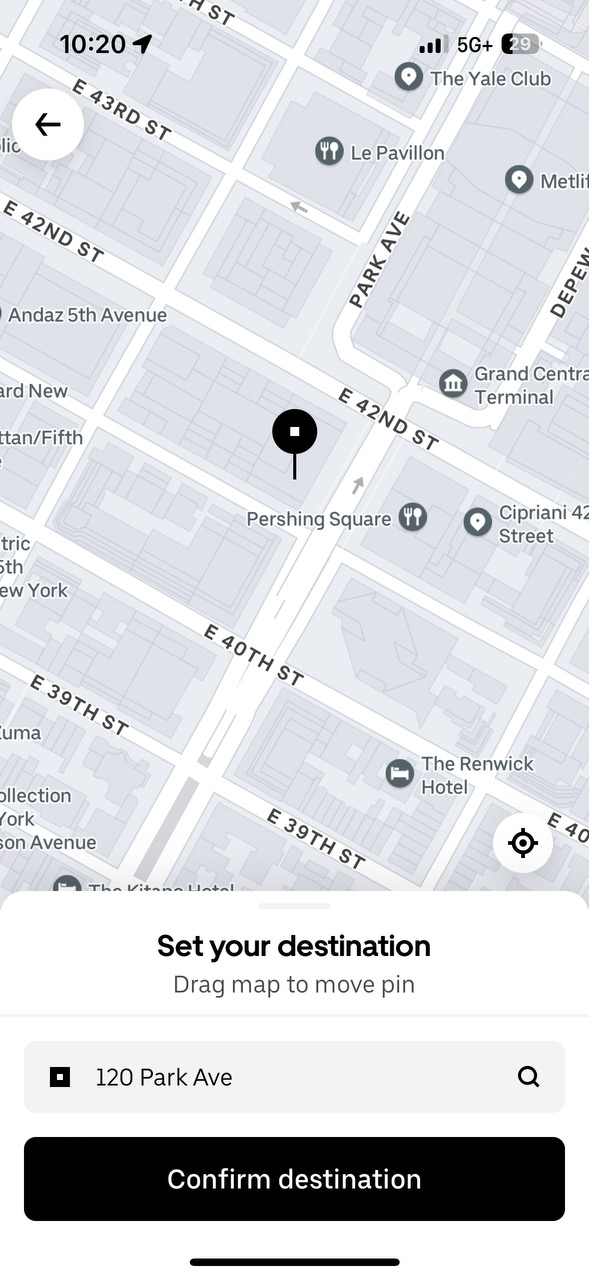Reverse geocoding: Convert latitude and longitude coordinates into addresses
Reverse geocoding transforms latitude and longitude coordinates into a human-readable format, like a street address or a place name.
There are many geocoding services out there, but some of them come with high costs, accuracy issues, or other limitations. You might want to consider using Radar's reverse geocoding API.
Read on to learn more about reverse geocoding and the features, benefits, and applications of Radar's reverse geocoding API.
What is reverse geocoding?
Geocoding is the process of converting between addresses and latitude and longitude coordinates.
Whereas forward geocoding converts addresses to lat/lngs, reverse geocoding transforms lat/lngs to addresses. IP geocoding transforms IP addresses to lat/lngs.

Reverse geocoding in the Uber app. Dropping a pin on the map converts the lat/lng of the pin to a destination address or place name.
To integrate geocoding into an app or website, you use a geocoding API or SDK. For example, a logistics app might use a reverse geocoding API to convert a pin dropped on a map into a place name or address. Or an e-commerce website might use a reverse geocoding API to suggest the current address for a user's current lat/lng.
Offline, you might use a geocoding API or a bulk geocoding service to geocode addresses or lat/lngs in a spreadsheet or a database.
Radar's reverse geocoding API
Radar offers a full suite of enterprise-ready geocoding APIs, including forward geocoding, reverse geocoding, and IP geocoding.
Our geocoding APIs are part of our broader Maps Platform, which also supports address autocomplete, address verification, places search, routing, base maps, and more.
Our Maps Platform is also complemented by our industry-leading Geofencing Platform, which supports geofencing, trip tracking, and place visit detection. All of these are also useful for logistics, e-commerce, and retail apps and websites that may need geocoding.
Radar is up to 90% cheaper than alternatives, with geocoding pricing that starts at $0.50 per 1,000 API calls, compared to $5 per 1,000 API calls from Google Maps Platform.
Try our reverse geocoding API
Visit our reverse geocoding product page to try out the reverse geocoding API.
You can also sign up for a developer account and try out the API explorer in the dashboard.
After you sign up, you can use your API key to make a reverse geocoding request:
curl "https://api.radar.io/v1/geocode/reverse?coordinates=40.7343,-73.9911&layers=address" \
-H "Authorization: prj_live_pk_..."
And here's a sample API response:
{
"meta": {
"code": 200
},
"addresses": [
{
"latitude": 40.734288,
"longitude": -73.991057,
"geometry": {
"type": "Point",
"coordinates": [
-73.991057,
40.734288
]
},
"country": "United States",
"countryCode": "US",
"countryFlag": "🇺🇸",
"county": "New York County",
"distance": 4,
"borough": "Manhattan",
"city": "New York",
"number": "841",
"neighborhood": "Greenwich Village",
"postalCode": "10003",
"stateCode": "NY",
"state": "New York",
"street": "Broadway",
"layer": "address",
"formattedAddress": "841 Broadway, Manhattan, New York, NY 10003 USA",
"addressLabel": "841 Broadway"
}
]
}
Or, on iOS, in Swift:
Radar.reverseGeocode(
location: location
) { (status: RadarStatus, addresses: [RadarAddress]?) in
// do something with addresses
}
On Android, in Kotlin:
Radar.reverseGeocode(location) { status, addresses ->
// do something with addresses
}
The response will include a structured address for the coordinates, including street address, city, postal code, and country.
Optionally, to return a specific type or granularity of address result you can specify layers, including one or more of place, address, postalCode, locality, county, state, country, coarse, and fine. Note that coarse includes all of postalCode, locality, county, state, and country, whereas fine includes address and place.
See our reverse geocoding API documentation for more details.
Get started
To learn more, check out our docs, get started for free, or request a demo.
FAQs
Is the reverse geocoding API accurate?
Radar’s reverse geocoding API incorporates both open and commercial datasets for maximum coverage at an affordable price relative to alternatives.
Is the reverse geocoding API affordable?
Radar is free up to 100,000 requests per month and only $0.50 for every 1,000 calls after that, with volume discounts available.
How does the reverse geocoding API compare to alternatives?
Radar is a more cost-effective solution than alternatives like Google Maps or Mapbox. In addition to a Maps Platform, Radar also has a Geofencing Platform.
What if I want to convert an address to latitude and longitude coordinates?
Forward geocoding converts addresses to latitude and longitude coordinates. Check out our forward geocoding API.
What if I want to convert an IP address to latitude and longitude coordinates?
IP geocoding converts an IP address to latitude and longitude coordinates. Check out our IP geocoding API.
What if I want to show address suggestions in a dropdown?
Address autocomplete returns suggestions for a partial address. Check out our address autocomplete API.
What if I want to validate an address?
Address validation validates complete structured addresses. Check out our address verification API.